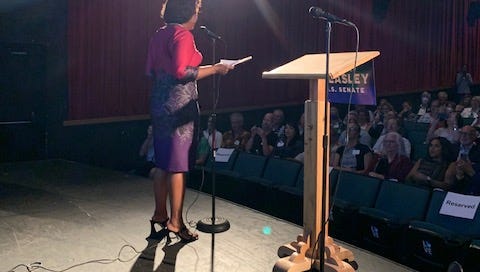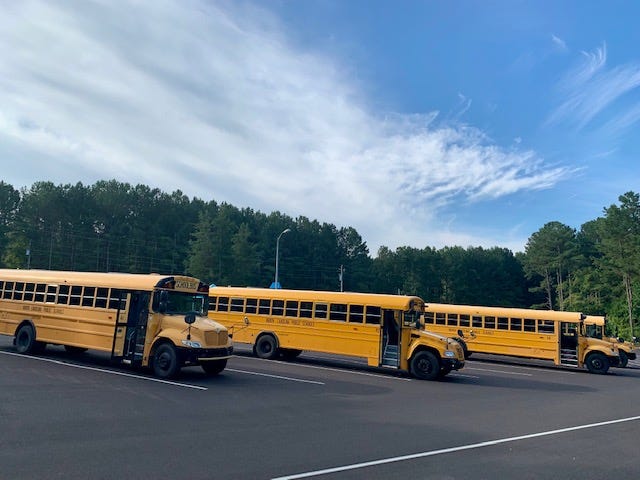Three women I know and admire are currently recovering from illness—not Covid, but life-interrupting, in-bed-for-days kinds of sickness all the same. They each said that they thought their immune systems had been weakened from stress. They each have young kids, work full-time, and are tasked with more than their fair share of caregiving.
What’s our fair share? Is it all that we can give, reasonably, without total depletion? How long can you give that much anyway? How do you know when you’re right before the total depletion stage? I think about this in PTA meetings, when the all-woman committees try to solve problems of not-enough-funding, teachers-stretched-too-thin (we actually have a very hardworking man on one of our committees). I think about it during the PTA meetings I miss because I’m double-booked with something else, or at work in one of the many all-female/non-binary zoom meetings and email threads about doing extra things to improve the lives and educational experiences of our students.
Every morning, usually right after I’ve walked Harriet into her classroom, I get to see the school buses pulling into the school parking lot. The buses are empty, and I watch as each driver expertly parks the bus, then makes her way up and down the empty aisles before disembarking and hurrying up the path into school. This is at 7:55, just as the morning announcements are beginning. The drivers have returned the buses after dropping off the middle school kids. They’ve probably been driving since at least 6:00 AM. Now they’re on their way to work as teachers’ assistants, which is how Chatham County school bus drivers turn what is generally a vastly underpaid, part-time job into a (still very underpaid) full-time-plus job. They won’t return the buses until about 4:30 in the afternoon, which means that most of these drivers have worked physically and emotionally demanding, ten-plus hour days.
These women have a much harder job than I do, and probably harder than my friends who are recovering from illness. Often when I’m given one task too many, I’ll think about bus drivers and teaching assistants, or even about past K-12 jobs I’ve had, and I’ll think well, this is not so bad. Could be worse! I don’t feel comforted, exactly, but I’m distracted from the feeling of annoyance or unfairness by considering my own part in the unfairness of the system. Look at me, telling stories and teaching other people to tell stories… for my job! How did I get this lucky?
At the same time, I do a lot of administrative tasks at work that make things run reasonably well. Like the work of a driver/assistant, it’s essential labor that depends on timing, detail, responsibility, empathy. This kind of work isn’t valued very much at universities, which means that women often get stuck doing it. It also isn’t valued in the K-12 world, which is why we pay bus drivers almost nothing, or insist that they pair that job with another highly demanding one.
This week in an email, a colleague thanked my for my efficiency and competence after I stepped in to do something time-sensitive. It was a compliment, but I knew he didn’t think that those two things were worth a lot—that’s why I was doing them, and not him. I do value efficiency and competence, so I’d behave that way whether I thought it would be noticed or not. Same goes for my friends who are all thankfully on the mend—they do all the teaching, service, and caregiving that causes their immune systems to suffer also because they value that work. They do it with efficiency and competence—and love. Without efficiency and competence (and love) a lot of things go to shit.
*
In better news this week, the Cheri Beasley event featuring North Carolina writers happened on Wednesday. It was a wonderful and inspiring night featuring readings by John Grisham, Jill McCorkle, Jaki Shelton Green, Gabriel Bump, Gene Nichol, Wiley Cash, and me—and it raised the most money her campaign has raised from any single event: $163,000! (I even auctioned off two kayak trips on the Haw River—my favorite place to be, especially this time of year.)
Cheri was there, of course, and she spoke powerfully at the cocktail reception and at the reading at the Varsity. She was wearing a beautiful jewel-tone dress, pearls, and a delicate gold #protectroe necklace (everyone wanted to know where she got it). Before we went on stage, we chatted with her in the green room.
Someone asked Cheri if she’d entered the most intense part of the campaign, the final stretch. She blinked, then leaned against the wall—just briefly touching her back to it before straightening up again. “It’s been like this for a year and a half,” she said. “It’s all I’ve done, from the time I wake up until I go to bed.”
She wasn’t complaining, just stating a fact. How she has managed to keep going amid the enormous stress, responsibility, and physical demands of a campaign that is so crucial to the lives of North Carolinians—and really all Americans, when you consider that hers could easily be the tie-breaking vote in the senate? She manages beautifully, but in that moment I saw that it was a lot.
A couple of times during the readings, people mentioned that Cheri, an attorney and judge with many years of public service to her name, does not have a worthy opponent. Ted Budd is in many ways as low and out-of-touch as Dr. Oz or Blake Masters. He voted against certifying American votes in the 2020 election. He voted against expanding health care for veterans exposed to toxic burn pits. His main qualification before the job he has now, in the U.S. Congress, is that he owns a gun store and shooting range. He’s just a rich boy whose family business screwed over farmers by transferring millions to themselves before a bankruptcy judgment.
It would be gratifying to see ads from Cheri making fun of Ted the same way John Fetterman makes fun of Dr. Oz. But there are a couple of reasons she can’t do that. Ted appears not to be on the campaign trail at all—he’s relying on the built-in racism and sexism of North Carolina voters and the millions of dollars pouring in from the RNC (currently pulling money from Oz, Masters, and Walker). Reason number two is the built-in racism and sexism of too many North Carolina voters—Cheri has to walk a fine line be perfect. From the time she gets up until she goes to bed.
I know this race will be close. Chief Justice Cheri Beasley (as Gene Nichol says she will always be to him) has so many supporters and the will of most North Carolinians is on her side. Most of us care deeply about her big issues: healthcare, the environment, public schools, good jobs, criminal justice reform, and protecting voting rights and reproductive rights. But there is still an undercurrent of ignorance and backwards-thinking we have to fight against. (You can give to Cheri right here.)
A few years ago, I was doing a residency at a high school in a rural, Western part of the state. The high school appeared to be run well by a kind, competent, smart principal who was new to the school. On a break between classes, I was chatting with one of the teachers, and he mentioned that a lot of the teachers had quit the year before. When I asked why, he said that it was because they couldn’t see working for a woman. The principal was a woman. That’s why people quit.
So, that’s what Cheri’s up against, and why it’s a good bet for the RNC to keep pouring money into the campaign of somebody who doesn’t work a tenth as hard as Cheri does.
Cheri is most certainly doing more than her fair share—as are so many women (and nonbinary folks and men) working on her campaign and on all the important races we have happening in North Carolina this fall. At the grassroots level, with groups like County to County, you’ll see big crowds of women at every canvassing event. All these people give me so much hope and strength—I appreciate them so much—but I also worry for them. I worry for my friends, and I worry for Cheri. I imagine that she is taking vitamin C and drinking lots of water. I imagine that, when she’s tired, she thinks about her past work as a public defender, and everything the poorest citizens are up against. Or about her late mother, a social worker with a PhD who dedicated her life to service but had to depend on the protections of the Voting Rights Act to cast her ballots. Maybe Cheri thinks about the little #protectroe nameplate resting at her collarbone.
There are lots of ways of gathering our strength. But how long can we keep going like this? Because win or lose, the work won’t stop in November. My own feeling is that more men need to step up into the everyday, nitty-gritty, unglamorous, competence-and-efficiency stuff so that things look more balanced by the time Bea and Harriet grow up. Anyone can be good at the details, if you value them enough. But that’s going to take some systemic change too—the details, and the people who keep the buses running (along with everything else we rely on), need to be valued by our systems.
How are you feeling right now, Frog Troublers? What gives you energy? For me, it’s the cooler air at night, random texts from my neighbor David (“the acorns are back”), and listening to Vivian Gornick on audiobook.
Sending you lots of love! More posts coming soon—thanks so much for keeping reading, and for all that you do in the world!






Great one. And like you, I've witnessed the undercurrent of racism and sexism that's still alive in our state. I know you are right, that's a reason Beasley is keeping her campain so above board, clean, and nice. I can only hope that we have great turnout in November. Kansas gave me hope!
Thank you Belle, great to hear your voice!
:)